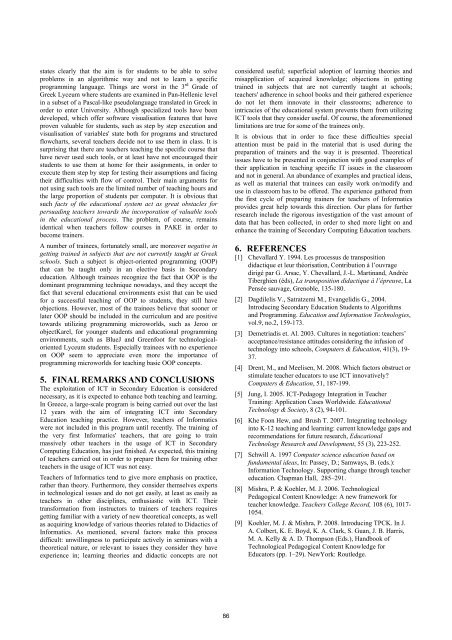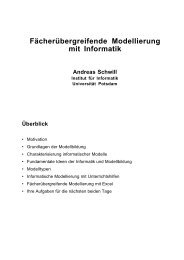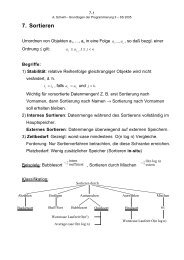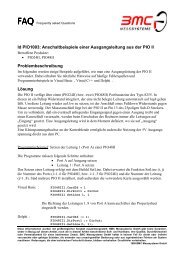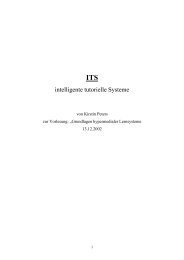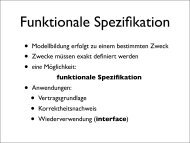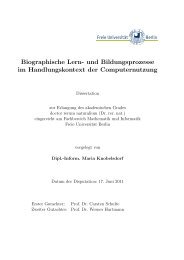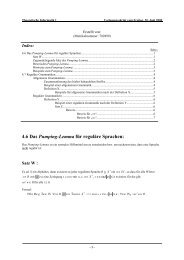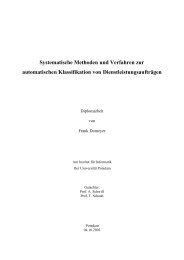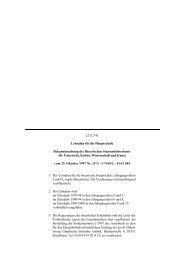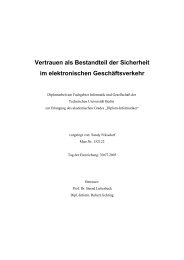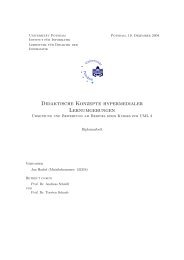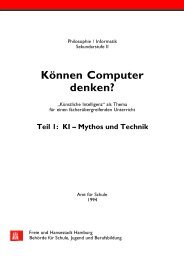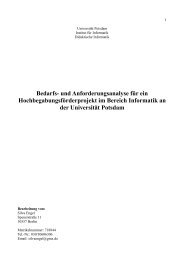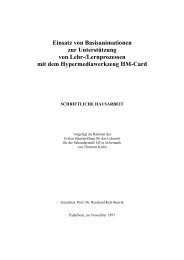Maria Knobelsdorf, University of Dortmund, Germany - Didaktik der ...
Maria Knobelsdorf, University of Dortmund, Germany - Didaktik der ...
Maria Knobelsdorf, University of Dortmund, Germany - Didaktik der ...
You also want an ePaper? Increase the reach of your titles
YUMPU automatically turns print PDFs into web optimized ePapers that Google loves.
states clearly that the aim is for students to be able to solve<br />
problems in an algorithmic way and not to learn a specific<br />
programming language. Things are worst in the 3 rd Grade <strong>of</strong><br />
Greek Lyceum where students are examined in Pan-Hellenic level<br />
in a subset <strong>of</strong> a Pascal-like pseudolanguage translated in Greek in<br />
or<strong>der</strong> to enter <strong>University</strong>. Although specialized tools have been<br />
developed, which <strong>of</strong>fer s<strong>of</strong>tware visualisation features that have<br />
proven valuable for students, such as step by step execution and<br />
visualisation <strong>of</strong> variables' state both for programs and structured<br />
flowcharts, several teachers decide not to use them in class. It is<br />
surprising that there are teachers teaching the specific course that<br />
have never used such tools, or at least have not encouraged their<br />
students to use them at home for their assignments, in or<strong>der</strong> to<br />
execute them step by step for testing their assumptions and facing<br />
their difficulties with flow <strong>of</strong> control. Their main arguments for<br />
not using such tools are the limited number <strong>of</strong> teaching hours and<br />
the large proportion <strong>of</strong> students per computer. It is obvious that<br />
such facts <strong>of</strong> the educational system act as great obstacles for<br />
persuading teachers towards the incorporation <strong>of</strong> valuable tools<br />
in the educational process. The problem, <strong>of</strong> course, remains<br />
identical when teachers follow courses in PAKE in or<strong>der</strong> to<br />
become trainers.<br />
A number <strong>of</strong> trainees, fortunately small, are moreover negative in<br />
getting trained in subjects that are not currently taught at Greek<br />
schools. Such a subject is object-oriented programming (OOP)<br />
that can be taught only in an elective basis in Secondary<br />
education. Although trainees recognize the fact that OOP is the<br />
dominant programming technique nowadays, and they accept the<br />
fact that several educational environments exist that can be used<br />
for a successful teaching <strong>of</strong> OOP to students, they still have<br />
objections. However, most <strong>of</strong> the trainees believe that sooner or<br />
later OOP should be included in the curriculum and are positive<br />
towards utilizing programming microworlds, such as Jeroo or<br />
objectKarel, for younger students and educational programming<br />
environments, such as BlueJ and Greenfoot for technologicaloriented<br />
Lyceum students. Especially trainees with no experience<br />
on OOP seem to appreciate even more the importance <strong>of</strong><br />
programming microworlds for teaching basic OOP concepts.<br />
5. FINAL REMARKS AND CONCLUSIONS<br />
The exploitation <strong>of</strong> ICT in Secondary Education is consi<strong>der</strong>ed<br />
necessary, as it is expected to enhance both teaching and learning.<br />
In Greece, a large-scale program is being carried out over the last<br />
12 years with the aim <strong>of</strong> integrating ICT into Secondary<br />
Education teaching practice. However, teachers <strong>of</strong> Informatics<br />
were not included in this program until recently. The training <strong>of</strong><br />
the very first Informatics' teachers, that are going to train<br />
massively other teachers in the usage <strong>of</strong> ICT in Secondary<br />
Computing Education, has just finished. As expected, this training<br />
<strong>of</strong> teachers carried out in or<strong>der</strong> to prepare them for training other<br />
teachers in the usage <strong>of</strong> ICT was not easy.<br />
Teachers <strong>of</strong> Informatics tend to give more emphasis on practice,<br />
rather than theory. Furthermore, they consi<strong>der</strong> themselves experts<br />
in technological issues and do not get easily, at least as easily as<br />
teachers in other disciplines, enthusiastic with ICT. Their<br />
transformation from instructors to trainers <strong>of</strong> teachers requires<br />
getting familiar with a variety <strong>of</strong> new theoretical concepts, as well<br />
as acquiring knowledge <strong>of</strong> various theories related to Didactics <strong>of</strong><br />
Informatics. As mentioned, several factors make this process<br />
difficult: unwillingness to participate actively in seminars with a<br />
theoretical nature, or relevant to issues they consi<strong>der</strong> they have<br />
experience in; learning theories and didactic concepts are not<br />
86<br />
consi<strong>der</strong>ed useful; superficial adoption <strong>of</strong> learning theories and<br />
misapplication <strong>of</strong> acquired knowledge; objections in getting<br />
trained in subjects that are not currently taught at schools;<br />
teachers' adherence in school books and their gathered experience<br />
do not let them innovate in their classrooms; adherence to<br />
intricacies <strong>of</strong> the educational system prevents them from utilizing<br />
ICT tools that they consi<strong>der</strong> useful. Of course, the aforementioned<br />
limitations are true for some <strong>of</strong> the trainees only.<br />
It is obvious that in or<strong>der</strong> to face these difficulties special<br />
attention must be paid in the material that is used during the<br />
preparation <strong>of</strong> trainers and the way it is presented. Theoretical<br />
issues have to be presented in conjunction with good examples <strong>of</strong><br />
their application in teaching specific IT issues in the classroom<br />
and not in general. An abundance <strong>of</strong> examples and practical ideas,<br />
as well as material that trainees can easily work on/modify and<br />
use in classroom has to be <strong>of</strong>fered. The experience gathered from<br />
the first cycle <strong>of</strong> preparing trainers for teachers <strong>of</strong> Informatics<br />
provides great help towards this direction. Our plans for further<br />
research include the rigorous investigation <strong>of</strong> the vast amount <strong>of</strong><br />
data that has been collected, in or<strong>der</strong> to shed more light on and<br />
enhance the training <strong>of</strong> Secondary Computing Education teachers.<br />
6. REFERENCES<br />
[1] Chevallard Y. 1994. Les processus de transposition<br />
didactique et leur théorisation, Contribution à l’ouvrage<br />
dirigé par G. Arsac, Y. Chevallard, J.-L. Martinand, Andrée<br />
Tiberghien (éds), La transposition didactique à l’épreuve, La<br />
Pensée sauvage, Grenoble, 135-180.<br />
[2] Dagdilelis V., Satratzemi M., Evangelidis G., 2004.<br />
Introducing Secondary Education Students to Algorithms<br />
and Programming. Education and Information Technologies,<br />
vol.9, no.2, 159-173.<br />
[3] Demetriadis et. Al. 2003. Cultures in negotiation: teachers’<br />
acceptance/resistance attitudes consi<strong>der</strong>ing the infusion <strong>of</strong><br />
technology into schools, Computers & Education, 41(3), 19-<br />
37.<br />
[4] Drent, M., and Meelisen, M. 2008. Which factors obstruct or<br />
stimulate teacher educators to use ICT innovatively?<br />
Computers & Education, 51, 187-199.<br />
[5] Jung, I. 2005. ICT-Pedagogy Integration in Teacher<br />
Training: Application Cases Worldwide. Educational<br />
Technology & Society, 8 (2), 94-101.<br />
[6] Khe Foon Hew, and Brush T. 2007. Integrating technology<br />
into K-12 teaching and learning: current knowledge gaps and<br />
recommendations for future research, Educational<br />
Technology Research and Development, 55 (3), 223-252.<br />
[7] Schwill A. 1997 Computer science education based on<br />
fundamental ideas, In: Passey, D.; Samways, B. (eds.):<br />
Information Technology. Supporting change through teacher<br />
education. Chapman Hall, 285–291.<br />
[8] Mishra, P. & Koehler, M. J. 2006. Technological<br />
Pedagogical Content Knowledge: A new framework for<br />
teacher knowledge. Teachers College Record, 108 (6), 1017-<br />
1054.<br />
[9] Koehler, M. J. & Mishra, P. 2008. Introducing TPCK. In J.<br />
A. Colbert, K. E. Boyd, K. A. Clark, S. Guan, J. B. Harris,<br />
M. A. Kelly & A. D. Thompson (Eds.), Handbook <strong>of</strong><br />
Technological Pedagogical Content Knowledge for<br />
Educators (pp. 1–29). NewYork: Routledge.


